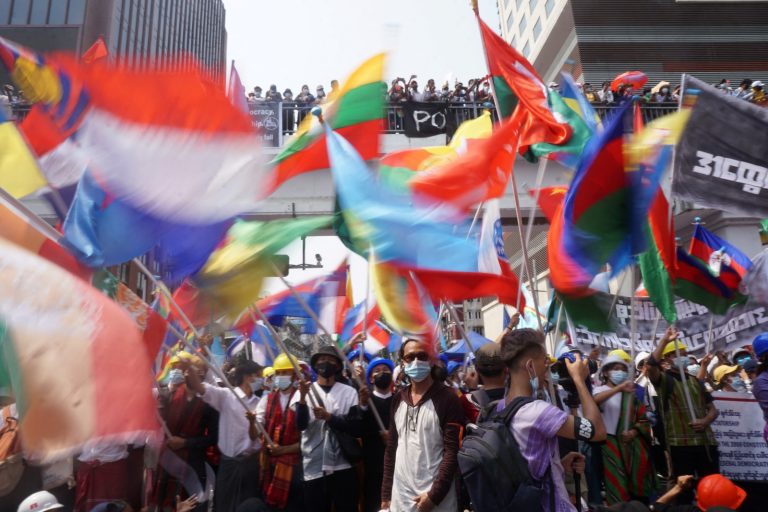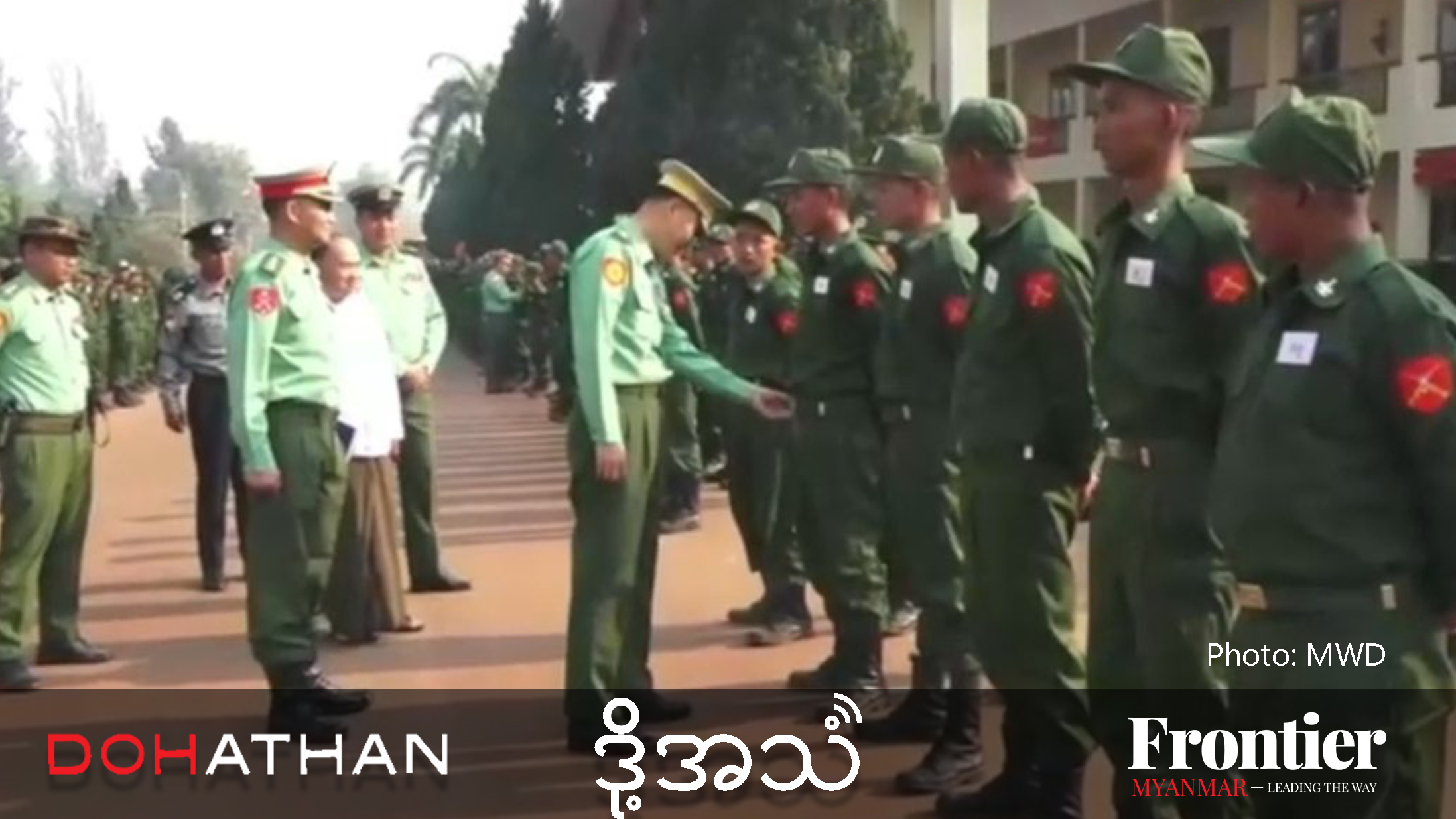The Arakan Army’s presence in southern Chin State has long been a source of ethnic tensions which have eased following the emergence of a common enemy after the coup, but the underlying disagreement over who should control Paletwa remains unresolved.
By FRONTIER
The fierce conflict between the Arakan Army and the Myanmar military, which peaked in Rakhine State between 2018 and 2020, actually started elsewhere, in neighbouring southern Chin State’s Paletwa Township. Strategically located on the Kaladan River and sharing a border with both Bangladesh and India, Paletwa was the first territory where the AA established a foothold in 2015, and became the launching pad for its war for autonomy.
The AA generally operates in Rakhine-majority areas where local populations are supportive of its mission. But its presence in Paletwa, where the majority of the population is Chin, led to a backlash and ethnic tensions.
“It instilled a great sense of fear within us whenever we encountered AA soldiers in the forest,” said 35-year-old Paletwa resident Salai Hu Lal.
Paletwa residents told Frontier that in the past, when AA troops entered Chin villages in the township, they ordered them to stay in the central residential areas and threatened them. If Chin civilians were found outside the village, they were allegedly assaulted and interrogated based on suspicion of providing information to the Myanmar military.
Another resident of Paletwa, 29-year-old Al Khu Bang Lai, said the war held the township back from developing healthcare, education and transportation infrastructure in comparison to the state capital Hakha.
“In Hakha, there is no AA, but Paletwa is under the AA, so there’s a big difference,” he said, adding that most people in Paletwa are Khumi Chin and speak a different language than in Rakhine.
Chin Human Rights Organization denounced in 2015 alleged abductions and the use of forced labour by the AA in Paletwa, whose residents were beginning to get caught in the crossfire of a war between the ethnic armed group and the Tatmadaw that had little to do with them.
Four years later, the Chin community marched in Yangon, demanding an end to the war. Protesters said the conflict had shut down schools, displaced thousands of Chin civilians and left some dead, and accused the AA of taking others hostage.
Then, in November 2020, the AA unexpectedly agreed to an informal ceasefire with the military, but the conflict landscape was further shifted dramatically by the February 2021 coup. While the AA has largely continued to observe this ceasefire, except for around four months of fighting last year, Chin State has erupted in an armed revolt against military rule.
“Since the coup, everyone has come to accept that the military is the common enemy. As a result, the AA no longer regards us with the same suspicion as before. There is now a sense of understanding between us,” said Hu Lal.
While the AA has largely avoided fighting the military after the coup, it has trained and supported new armed resistance groups and taken advantage of the turmoil to build up its rival administration in Rakhine.
Prominent Rakhine politician U Pe Than, who won a seat in parliament in the 2020 election as a candidate for the Arakan National Party, said the brutality Chin people have suffered under the military regime has changed their minds about the AA.
“After the coup, Chin State emerged as a significant region in the fight against the military, and as a consequence, it has suffered greatly. The Myanmar military has brutally killed Chin people on multiple occasions, including in deadly airstrikes,” he said, adding that there has been a “settlement” between the AA and Chin armed groups.

Training the resistance
There are a number of factors that contribute to Paletwa being a disputed territory. Foremost is its strategic importance, as a conduit connecting Rakhine to India via the Kaladan River. Some reports indicate that AA weapons shipments have likely passed through Paletwa.
But there are also cultural and historical reasons for the dispute. While definitively majority Chin, the township hosts a substantial Rakhine population; General Administration Department figures from 2019 show that Paletwa is around 83 percent Chin and 17pc Rakhine.
Under British colonial rule, Paletwa was known as the Arakan Hill Tract and was part of the Arakan Division. Like much of Rakhine, Paletwa is separated from the rest of Myanmar by a rugged mountain range – the Chin Hills and the connected Rakhine Yoma. While Paletwa is in the foothills, the rest of Chin State lies in the midst of this mountain range.
Both Rakhine and Chin nationalists have long viewed Paletwa as naturally part of their territory. But since the coup, a common enemy has eased tensions between Chin and Rakhine communities, not least because the AA has played an active role in training fledgling Chin armed groups fighting the military junta.
“The Chin armed forces have established connections with the AA, whose leaders have also provided military assistance to the Chin forces,” said Pe Than.
According to Paletwa residents, the current state of friendly relations means the AA can now travel in and out of Chin villages with no tensions.
Various armed groups across the country congratulated the AA on its 14th anniversary event on April 10, including the Chin National Defence Force and Chinland Defence Force, two of the most significant Chin armed groups to emerge since the coup. Two weeks later, the AA returned the gesture on CDF’s two-year anniversary.
A spokesperson for CDF-Mindat confirmed to Frontier on May 29 that the group has received weapons, military training and strategic advice from the AA.
“Yes, it’s true that we received military training from the AA, and we appreciate their help. As of now, we have a common enemy to fight – the Myanmar military – and we will join hands with anyone who shares the same goal,” he said. “Only the lobbyists for the Myanmar military would attempt to undermine our relationship with the Rakhine people. The Rakhine people are our brothers and sisters,” he added.
However, if the ultimate goal of the uprising, to overthrow the military regime, were realised, that would remove the common enemy that has brought the two groups together, while the question of who ought to control Paletwa remains unresolved.
Overlapping claims
In late March, the Interim Khumi Affairs Coordination Council, the resistance local authority, and CDF-Paletwa held a two-day summit declaring Paletwa Township an autonomous district. They said under this arrangement, the governing body overseeing the district will be known as the Paletwa Autonomous District Council.
A PADC spokesperson told Frontier in late May that this designation includes all of Paletwa Township.
“As part of the aspiration to establish a federal democracy, the Paletwa Autonomous District Council has appointed elected civilian authorities,” he claimed.
He said these officials were chosen by the local population to carry out administrative and judicial services in the absence of the junta’s own governing mechanisms, which have collapsed in some areas throughout Myanmar, including most of Paletwa, since the coup. He said the PADC is part of the Interim Chin National Consultative Committee and is working with National Unity Government ministries.
The NUG is a parallel government appointed by elected lawmakers deposed in the coup. Some ethnic states have formed their own bodies, like the ICNCC, generally made up of local armed groups, politicians, striking civil servants and civil society groups.

“While our progress at the union level is still ongoing, notable developments have already taken place in the education and health sectors under our administration,” he added. “And the NUG has recognised what we have achieved so far.”
The spokesperson claimed Paletwa has been part of Chin State since the colonial era, is designated as such in the original 1947 constitution, and is home to a larger ethnic Chin population.
“I will refrain from commenting on the ongoing movements of the AA in Paletwa Township. However, I can say that their presence in Paletwa is temporary during this revolutionary period,” he said. “It’s important to note that Paletwa belongs to Chin State and its fate lies in the hands of all Paletwa citizens.”
However, prominent Rakhine figures disagreed. Pe Than, the ANP politician, said there are historical and geographic reasons for Paletwa to be incorporated into AA territory.
“Due to its location on the Kaladan River, it’s easier to reach Paletwa from Rakhine than from Matupi Township, which is separated by the Chin Hills,” he said, referring to the Chin township bordering Paletwa. Pe Than said because of this, Paletwa is heavily reliant on trade with Rakhine, particularly for fish products.
“Paletwa has inherited significant elements of Rakhine’s history and culture over the course of dynastic eras,” he added, referring to the long pre-colonial period when the kingdom of Arakan was an independent regional power.
The AA, one of the strongest non-state armed groups in the country, remains far more powerful than any of its more disjointed Chin counterparts, none of which have established a major military presence in Paletwa.
Because of this Pe Than also doubted that Chin groups could actually control and administer the township.
“Declaring an autonomous region implies that you possess the necessary weapons and capacity to confront and overcome opposing forces,” he said. “It would be more effective if the Chins could establish a governing body with the ability to wield such power.”
Dr Aye Maung, a popular Rakhine nationalist politician and founder of the Arakan Front Party, agreed that announcements hold little weight if they can’t be backed up.
“Everybody makes these announcements, but the final outcome will be determined by the actual events that unfold,” he said, adding that the conflict is a “troubled triangle” because the Myanmar military also claims the territory.
The PADC spokesperson said the AA has not yet responded to the declaration of Paletwa as an autonomous district.
“We don’t intend to cause any trouble. Everything we did is in accordance with the law,” he said, adding that for now, the groups must remain united against the junta.
Because of its far superior position on the ground at the moment and its friendly relationship with Chin armed groups opposing the junta, the AA may feel little need to respond to the declaration.
“They are doing their job, so there’s nothing special to comment on,” said AA spokesperson Khaing Thu Kha, who declined to elaborate.
Meanwhile, Salai Htet Ni, spokesperson for the Chin National Front, the state’s oldest ethnic armed group, took a more cautious stance, and downplayed the disagreement.
“The issue of Paletwa is a matter that will be resolved later,” he told Frontier. “Land disputes are common to all nations. There are no insurmountable problems. There is no major disagreement between Chin and Rakhine.”







